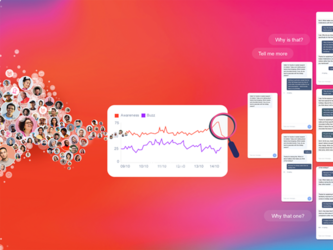Bring on the secret shoppers
I have been closely following Mary Portas’ crusade to save the reputation of the service industry in her Channel 4 series Secret Shopper. Armed with a hidden camera and a selection of disguises, the retail expert goes shopping undercover to experience store service first hand, before revealing her true identity and helping stores turn things around. Her mission to “wage war on poor service in Great Britain” has made sure customer service is on companies’ agendas, and will with luck encourage the public to tell retailers directly when they’re not happy.
Portas paints a bleak picture of the British high street – with many retailers so profit-driven that the customer comes second, and little or no investment in staff or service. Surely there’s an opportunity for businesses who put the customer first? After all, great service leads to happier customers who are more likely to return and recommend, staff who are more motivated to deliver and stay in their jobs longer, and stronger brands.
“Brands that work to identify and address what matters most to their customers reap the benefits in better performance and a differentiated customer experience”
For me, the programme underlines the value of research in providing an accurate picture of what’s going on in-store and how retailers can measure the affect of any changes on financial results. Of course in real life we don’t don disguises or hide cameras in our bags, but essentially what Mary Portas is doing is mystery shopping – getting a picture of what’s happening on the frontline and then taking this back to the boardroom to open the eyes of bosses to what their customers experience.
Performance measurement like this is key to driving improvement. Brands that work to identify and address what matters most to their customers reap the benefits in better performance and a differentiated customer experience.
The first episode of Secret Shopper sees Portas take on the world of ‘fast fashion’. In a series of video snippets recorded in a number of well-known high street stores, we see and hear the scale of the problem. Queues of up to 25 people at a time, employees with little or no product knowledge who spend the day standing by the till talking to their friends instead of serving. In spite of their proud slogans about putting customers first, retailers are not giving enough support to the frontline.
Portas gets to work on fashion chain Pilot, whose managing director is content that his stores are turning decent profits, and hasn’t taken the time to visit them to observe the customer experience or meet staff. Using the Braintree store as a prototype, Portas turns Pilot into a more consumer-friendly place, firing up the shop floor team to deliver better service, teaching them her golden rules of service and refitting the changing rooms to make them fun and fashion-focused. These thoughtful yet simple changes delivered immediate improvements with a sustainable effect on the store’s takings.
Secret Shopper illustrates how close the link between research and performance improvement needs to be. We saw how employees at sofa store CSL, which prides itself on its ‘customer comes first’ ethos, were really working from a script, hitting their targets but not really listening to customer needs, and delivering a poor experience. There was clearly a disconnection between the company’s professed values and what was happening in reality, which mystery shopping would have identified.
Portas’ solution was to teach staff and managers the value of listening to customer requirements, understanding the whole purchase experience from the customer’s point of view. Profits, she said, would remain healthy, customers would be more likely to return and recommend, staff turnover would be lower and the brand’s long-term reputation would be safeguarded.
It’s important to remember that shop floor staff will know more about the customer than researchers ever will. The key to better customer satisfaction is to empower those that deliver it to do it better, by supporting them with rapid and insightful research delivered at the frontline.
We work closely with retailers to ensure that their mystery shopping and customer satisfaction programmes are not just seen as box-ticking exercises, but provide valuable insight into how customers are feeling and what matters most to them – which can be very different from how the brand is perceived. The results enable the retailer to identify areas for staff training and development and reinforce the brand values, as well as pinpointing drivers of advocacy. With employees educated and motivated to perform, they can deliver an experience that drives satisfaction and profitability.
Customer research falls flat without the connection to performance improvement. Feedback that is acted upon right across the brand is vital to business success, but it is when results are acted upon at a local level, as Portas demonstrates, that they create great customer relationships, loyalty and advocacy – key elements of a successful, sustainable business.

We hope you enjoyed this article.
Research Live is published by MRS.
The Market Research Society (MRS) exists to promote and protect the research sector, showcasing how research delivers impact for businesses and government.
Members of MRS enjoy many benefits including tailoured policy guidance, discounts on training and conferences, and access to member-only content.
For example, there's an archive of winning case studies from over a decade of MRS Awards.
Find out more about the benefits of joining MRS here.













2 Comments
Matt Hardwick
15 years ago
Hi Jamie, Great article - and I too have been following the Portas series with a mixture of horror, fascination, and glee. However, I can't help thinking that she's missing the point - at least in part - when it comes to the business model of some businesses. Take estate agents for example. The remuneration structure in most standard agencies is based on volume throughput which means your average agent simply throws a lot of viewings at the wall to see what sticks. Furthermore, the top-down strategy in nearly every agency I've ever come across (sadly, that is many) is to hire cheap, high-turnover staff and so reduce the cost structure of the agency business model. As a result, customer satisfaction in such a business - where the customer return cycle is so infrequent - is not a key profit driver. My point is this: Championing the customer and designing rote sales methods (as Portas does in each of her programmes) will come to nothing unless the underlying financial and strategic structures of the industries in question change to better serve the customer. And we all know that's not likely to happen any time soon and all the customer insight in the world won't make the slightest piece of difference in many industries where the underlying structure means the customer doesn't take primacy. Matt
Like Reply Report
Val
15 years ago
I think that Hidden Cameras are the way so many thins are solved now days. It is very hard to deny when you are on video. I applaud your efforts!
Like Reply Report